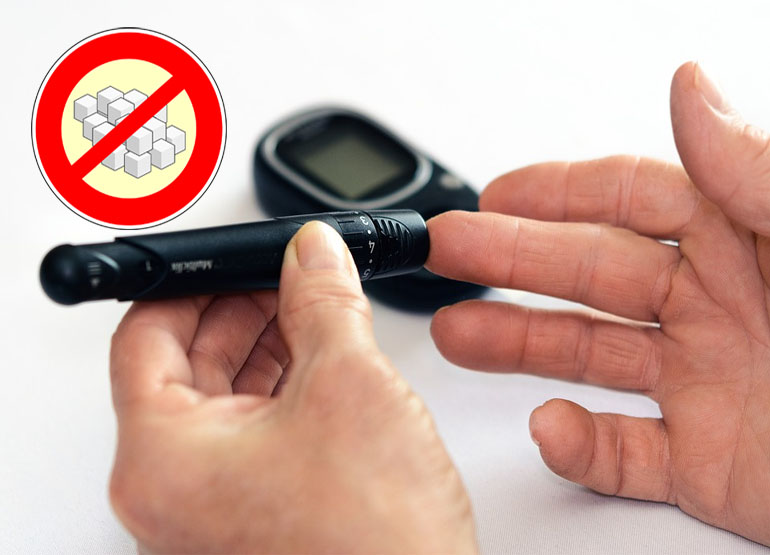Health Pages
Diabetes Mellitus
Diabetes Mellitus
Diabetes mellitus (DM), commonly referred to as diabetes, is a group of metabolic disorders that affect how your body uses blood sugar (glucose). People with diabetes have high blood sugar levels over a prolonged period.
There are three main types of diabetes mellitus:
 TYPE 1 diabetes occurs when the pancreas fails to produce any insulin at all. Approximately 10 % of all people with diabetes have this form of the disease. It usually occurs before age 40.
TYPE 1 diabetes occurs when the pancreas fails to produce any insulin at all. Approximately 10 % of all people with diabetes have this form of the disease. It usually occurs before age 40.
 TYPE 2 diabetes occurs when the pancreas does not produce enough insulin or when the body does not effectively use the insulin that is produced. It is far more common and usually develops in adulthood. Approximately 90 % of people with diabetes have this form.
TYPE 2 diabetes occurs when the pancreas does not produce enough insulin or when the body does not effectively use the insulin that is produced. It is far more common and usually develops in adulthood. Approximately 90 % of people with diabetes have this form.
 GESTATIONAL diabetes occurs when pregnant women without a previous history of diabetes develop high blood sugar levels.
GESTATIONAL diabetes occurs when pregnant women without a previous history of diabetes develop high blood sugar levels.
Symptoms of diabetes vary depending on how much your blood sugar is elevated. Some people will have only very mild symptoms or they may not experience symptoms initially (especially those with pre-diabetes or type 2 diabetes). Symptoms of type 1 diabetes tend to be more severe and come on quickly.
THE SYMPTOMS OF DIABETES:
 Frequent urination.
Frequent urination.
 Unusual thirst.
Unusual thirst.
 Changes in appetite.
Changes in appetite.
 Extreme fatigue.
Extreme fatigue.
 Irritability.
Irritability.
 Unexplained weight loss.
Unexplained weight loss.
 Nausea or stomach cramps.
Nausea or stomach cramps.
 Tingling or numbness in hands or feet.
Tingling or numbness in hands or feet.
 Slow-to-heal cuts, sores or skin infections.
Slow-to-heal cuts, sores or skin infections.
 Frequent infections, such as gums or skin infections and vaginal infections
Frequent infections, such as gums or skin infections and vaginal infections
NOTE: If you are worried that you may have some of the above symptoms, you are recommended to talk to your physician or some other qualified health professional.
TO TREAT TYPE 1 DIABETES
Individuals must inject insulin daily to help the sugar in food enter the body's cells. Healthy meal plan and regular exercise are important aspects of treatment.
TO TREAT TYPE 2 DIABETES
People with type 2 diabetes often can be treated through diet and exercise alone, or diet and exercise in combination with oral medications or insulin injections.
GESTATIONAL DIABETES
It is a type of diabetes that usually resolves after the birth of the baby. Gestational diabetes develop during pregnancy when hormones produced by the placenta prevent the body's insulin from working effectively. In most cases, when the placenta is removed at childbirth, the hormone levels return to normal. Woman who has had gestational diabetes may have 30-60 % higher risk of developing Type 2 diabetes later in life.
The cause of diabetes is not yet known. Four out of every ten people with diabetes will develop complications such as: cardiovascular, eye and kidney disease. By managing the diabetes disease carefully, a person can substantially reduce the risk of complications. Keep blood sugar levels as near to normal as possible to prevent complications from developing. Find out more about diabetes...
Diabetic Emergencies
Insulin and some oral medications can cause low blood sugar. Low blood sugar (hypoglycemia) is common in persons with type 1 and type 2 diabetes. It happens to people with diabetes when they have a mismatch of medicine, food, and/or exercise. Most cases of hypoglycemia are mild and are not considered medical emergencies. Effects can range from feelings of unease, sweating, trembling, weakness, and increased appetite in mild cases to rapid breathing and sweating, accelerated heart rate, anxiety, dizziness, cold and pale skin. Mild to moderate cases are self-treated by eating or drinking something high in sugar.
More serious issues of hypoglycemia (sometimes called diabetic shock) may involve: confusion, changes in behavior such as aggressiveness, concentration problems, irrational and disorderly behavior (similar to intoxication), seizures, unconsciousness, inability to eat or drink, and (rarely) permanent brain damage or death in severe cases. Severe cases of hypoglycemia can lead to unconsciousness and must be treated with intravenous glucose or injections with glucagon.
Hyperosmolar Hyperglycaemic State (HHS) is a dangerous condition resulting from very high blood glucose levels. This rare but equally severe possibility is more common in type 2 diabetes and is mainly the result of dehydration.
Did You Know?
"You can live a long and healthy life by keeping your blood sugar levels in the target range set by you and your health-care provider. "



